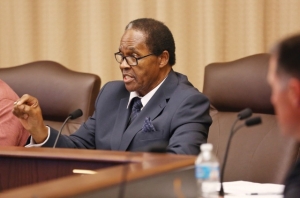Race and city police
By Ethan Smith
Published in News on January 6, 2015 1:46 PM

News-Argus/MELISSA KEY
Council member Rev. Charles Williams speaks to the topic of race relations in the community.

News-Argus/MELISSA KEY
"There are fundamental flaws in the unbridled authorization of police officers to use force against individuals who are not involved in the commission of a violent felony and are not posing an immediate physical threat to the officers or a third party." -- Sylvia Barnes, president of the Goldsboro-Wayne branch of the NAACP
The president of the local chapter of the NAACP challenged the Goldsboro City Council Monday night to deal head-on with alleged problems between police and the black community.
Sylvia Barnes said a conversation on race has to be started in this community or else tense relations between police and the black community will continue.
Her appearance at council's Monday night meeting was part of a statewide effort by the NAACP to start conversations at local levels about race relations and law enforcement.
Ms. Barnes invoked the cases of Michael Brown, Eric Garner, Jonathan Ferrell and Jesus Huerta, each of which involved the use of violence by police.
"There are fundamental flaws in the unbridled authorization of police officers to use force against individuals who are not involved in the commission of a violent felony and are not posing an immediate physical threat to the officers or a third party," Ms. Barnes said.
She suggested several changes to local law enforcement in order to combat or prevent the issues she raised:
* Special prosecutors who are not politically connected to the local police department to handle police shooting challenges.
* Mandatory training on racial bias and police use of force.
* The required use of police officer body-worn cameras to record all police-civilian encounters.
* Better accountability of the use and potential distribution and use of federal military weapons by local law enforcement.
* The universal use of dash cameras in police vehicles.
* Community training to educate residents of their right when dealing with law enforcement.
* Greater and more effective community oversight over local law enforcement and policing tactics.
* The establishment of a law enforcement commission to review policing tactics that would include representatives from the most impacted communities.
Mayor Al King offered to personally meet with Ms. Barnes and her local chapter after her speech during the public comment period.
"I want you to know that what you've seen in other cities isn't happening here," King said to Ms. Barnes. "We're very careful as to whom we give a gun, a badge and a car with blue lights."
Councilman Charles Williams backed up the mayor's statements.
"Chief (Jeff) Stewart has always told me he would deal with any policeman he caught breaking the rules," he said.
Councilman Michael Headen said he saw the need for a discussion about race when he was elected to City Council, and that after Ms. Barnes' comments Monday night, he said he would revive his efforts on the issue.
"Eight years ago when I was elected to this office I said this city had a difficult time talking about tough issues, and I'll say it again," Headen said. "I can't think of a more salient time to talk about it. We need to be grown- ups and we need to address it."
When underlying issues aren't discussed, especially those dealing with race, the consequences can be fatal, Ms. Barnes said.
"We have to address the issue of race here and make people feel like they belong and aren't objects," she said.
When officers ride through Seymour Homes, they aren't just looking for drug dealers or criminals -- though that is part of their job. They are also making an effort to get to know the community, and the community needs to become comfortable with an officer's presence, she said.
"To get the conversation started we have to be honest and say what we feel and think in our hearts," Ms. Barnes said. "We can't be afraid. We have to say what should be said."
